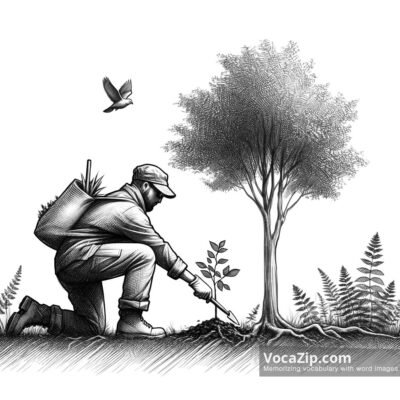conserve meaning
conserve :
preservation, protection
noun
▪ The conserve of energy is important.
▪ Saving energy is important.
▪ We need to focus on the conserve of water.
▪ We need to focus on saving water.
paraphrasing
▪ preservation – saving
▪ safeguarding – protecting

conserve :
to save, to protect
verb
▪ We must conserve water.
▪ We must save water.
▪ They conserve energy by using solar panels.
▪ They save energy by using solar panels.
paraphrasing
▪ preserve – to save
▪ maintain – to keep
▪ protect – to guard
▪ save – to keep safe
Pronunciation
conserve [kənˈsɜːrv]
The stress is on 'serve' and sounds like 'kuhn-surv'.
Common phrases and grammar about conserve
conserve - Common meaning
noun
preservation, protection
verb
to save, to protect
Part of Speech Changes for "conserve"
▪ conservation (noun) – the act of saving or protecting
▪ conservator (noun) – a person who saves or protects
▪ conservative (adjective) – careful to save or protect
▪ conservatively (adverb) – in a way that saves or protects
Common Expressions with "conserve"
▪ conserve energy – to save energy
▪ conserve resources – to save resources
▪ conserve water – to save water
▪ conserve wildlife – to protect animals
Important examples of conserve in TOEIC
Vocabulary examples from the TOEIC test
In TOEIC word questions, conserve is often used to mean saving resources like energy or water.
Example of a confusing word: converse (to talk)
Grammar examples from the TOEIC test
Conserve is often used as a transitive verb in TOEIC questions, meaning it requires an object.
conserve
Idioms and fixed expressions in TOEIC
energy conservation
'saving energy', used in discussions about reducing energy use.
conserve one's strength
means 'to save one's energy', used when someone needs to rest to be strong later.
Differences between similar words and conserve
conserve
,
preserve
differences
Conserve focuses on saving from being used up, while preserve focuses on keeping in good condition.
conserve
,
save
differences
Conserve often implies a careful or planned saving, while save can be more general.
Words with the same origin as conserve
The origin of conserve
conserve comes from the Latin 'conservare', which means 'to keep or guard together'.
Word structure
It has the prefix con (together), root serv (to keep), and suffix e (verb), meaning 'to keep together'.
Words with the same origin
The root of conserve is serv (to keep). Words with the same root include preserve (to keep in good condition), reserve (to keep back), observe (to watch or keep an eye on).
Please select an image in the quiz
Previous post and next post







